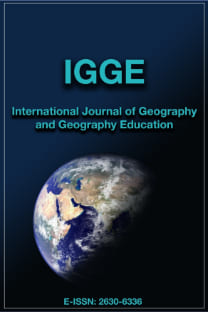EXPLORING THE OPPORTUNITIES OF VIRTUAL FIELDWORK IN TEACHING GEOGRAPHY DURING COVID-19 PANDEMIC
Virtual Fieldwor, Covid-19, E-Learning, Distance Education, TPACK, Geography
EXPLORING THE OPPORTUNITIES OF VIRTUAL FIELDWORK IN TEACHING GEOGRAPHY DURING COVID-19 PANDEMIC
Virtual Fieldwor, Covid-19, E-Learning, Distance Education, TPACK, Geography,
___
- Bacon, K. L., & Peacock, J. (2021). Sudden challenges in teaching ecology and aligned disciplines during a global pandemic : Reflections on the rapid move online and perspectives on moving forward. Ecology and Evolution, 11, 3551–3558. https://doi.org/10.1002/ece3.7090
- Bos, D., Miller, S., & Bull, E. (2021). Using virtual reality (VR) for teaching and learning in geography: fieldwork, analytical skills, and employability. Journal of Geography in Higher Education, 45(4), 1–10. https://doi.org/10.1080/03098265.2021.1901867
- Çaliskan, O. (2011). Virtual field trips in education of earth and environmental sciences. Procedia - Social and Behavioral Sciences, 15(2011), 3239–3243. https://doi.org/10.1016/j.sbspro.2011.04.278
- Evelpidou, N., Karkani, A., Saitis, G., & Spyrou, E. (2021). Virtual field trips as a tool for indirect geomorphological experience : A case study from the southeast part of the Gulf of Corinth , Greece. Geoscience Communication Discussions, 4(3), 1–16. https://doi.org/https://doi.org/10.5194/gc-2021-8
- Firomumwe, T. (2019). Experiences out of the Classroom: The Importance of Fieldwork in Learning Geography at Secondary School. i-manager’s Journal on School Educational Technology, 14(3), 16–24. https://doi.org/10.26634/jsch.14.3.15169
- Firomumwe, T. (2021). An Assessment on the Implementation of GIS and Remote Sensing in Teaching Geography in Zimbabwean Secondary Schools. i-manager’s Journal on School Educational Technology, 16(4), 22–30. https://doi.org/10.26634/jsch.16.4.17991
- Fuller, S., Ruming, K., Burridge, A., Carter‐White, R., Houston, D., Kelly, L., Lloyd, K., McGregor, A., McLean, J., Miller, F., O’Gorman, E., Suchet‐ Pearson, S., Taylor, H., Walkerden, G., Williams, M., & Ziller, A. (2021). Delivering the discipline: Teaching geography and planning during COVID‐19. Geographical Research, 59(3), 331–340. https://doi.org/10.1111/1745-5871.12472
- Granshaw, F. D., & Duggan-Haas, D. (2012). Virtual fieldwork in geoscience teacher education : Issues , techniques , and models. Geological Society of America Special Paper, 2492(20), 285–303. https://doi.org/10.1130/2012.2492(20).
- Haris, N., & Osman, K. (2015). THE EFFECTIVENESS OF A VIRTUAL FIELD TRIP ( VFT ) MODULE IN LEARNING BIOLOGY. Turkish Online Journal of Distance Education-TOJDE, 16(3), 102–117.
- Maskall, J., Stokes, A., Truscott, J. B., Bridge, A., Magnier, K., Calderbank, V., Maskall, J., Stokes, A., Truscott, J. B., Bridge, A., Magnier, K., Maskall, J., Stokes, A., Truscott, J. B., Bridge, A., Magnier, K., & Calderbank, V. (2007). Supporting fieldwork using information technology. Planet, 18(1), 18–21. https://doi.org/10.11120/plan.2007.00180018
- Mishra, P., & Koehler, M. J. (2006). Technological Pedagogical Content Knowledge: A framework for Teacher Knowledge. Teacher College Record, 108(2), 1017–1054.
- Ruan, L., Long, Y., Zhang, L., & Lv, G. (2021). A Platform and Its Applied Modes for Geography Fieldwork in Higher Education Based on Location Services. International Journal of Geo-Information, 10(225), 3–17. https://doi.org/https://doi.org/10.3390/ijgi10040225
- Sanchez, E. (2009). Innovative Teaching/Learning with Geotechnologies in Secondary Education. IFIP World Conference on Computers in Education, 65–74.
- Shailey, M., Ana-Despina, T., & Steve, T. (2017). Affordances of Mobile Virtual Reality and their Role in Learning and Teaching. The 31st British Human Computer Interaction Conference, 1–10. https://doi.org/10.14236/ewic/HCI2017.44
- Shailey, M., Steve, T., & Ana-Despina, T. (2018). Role of Virtual Reality in Geography and Science Education. Knowledge Exchange Seminar Series, Learning from New Technology, 1–14. oro.open.ac.uk
- Shulman, L. S. (1986). Those who understand: Knowledge growth in Teaching. Educational Researcher, 15(2), 4–14.
- Thorndycraft, V. R., Thompson, D., & Tomlinson, E. (2009). Google Earth , virtual fieldwork and quantitative methods in Physical Geography. Planet, 22(1), 48–51. https://doi.org/10.11120/plan.2009.00220048
- Trigueros Gómez, I. M. (2018). New learnıng of geography wıth technology: The TPACK Model. European Journal of Geography, 9(1), 38–48.
- Welsh, K. E., Mauchline, A. L., Powell, V., France, D., Park, J. R., & Whalley, B. W. (2015). Student perceptions of iPads as mobile learning devices for fieldwork. Journal of Geography in Higher Education, 39(3), 450–469. https://doi.org/10.1080/03098265.2015.1066315
- Yıldırım, S., & Ünlü, M. (2021). Evaluating in-service GIS training for geography teachers based on G-TPACK model. International Journal of Geography and Geography Education (IGGE), 44, 112–123. https://doi.org/10.32003/igge.958881
- Yayın Aralığı: Yılda 3 Sayı
- Başlangıç: 1996
- Yayıncı: Marmara Üniversitesi
KIRSAL ALAN POTANSİYELİNİN KIRSAL KALKINMAYA ETKİSİ ÜZERİNE NİTEL BİR ARAŞTIRMA: MUŞ İLİ ÖRNEĞİ
IMPACT OF MIGRATION ON EARLY LEARNERS’ VACCINATIONS IN A MOUNTAIN LEARNING ECOLOGY
SİYASİ COĞRAFYA VE JEOPOLİTİKTE KARİKATÜRLERİN KULLANIMI ÜZERİNE BİR DEĞERLENDİRME
BALIKESİR'DE BESLENME ALIŞKANLIKLARINI ETKİLEYEN FAKTÖRLERİN VE ALGILARIN İNCELENMESİ
Göksel Kemal GİRGİN, Alper UZUN
BALIKESİR'DE BESLENME ALIŞKANLIKLARINI ETKİLEYEN FAKTÖRLERİN VE ALGILARIN İNCELENMESİ
Göksel Kemal GİRGİN, Alper UZUN
MÜZELER VE TOPLUMSAL HAFIZA İLİŞKİSİ: SÜLEYMAN DEMİREL DEMOKRASİ VE KALKINMA MÜZESİ ÖRNEĞİ
İsmail KERVANKIRAN, Orhan ÇALIŞIRIM
EXPLORING THE OPPORTUNITIES OF VIRTUAL FIELDWORK IN TEACHING GEOGRAPHY DURING COVID-19 PANDEMIC
